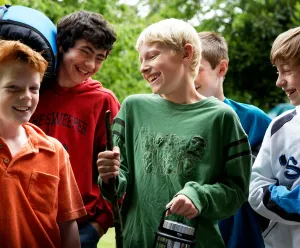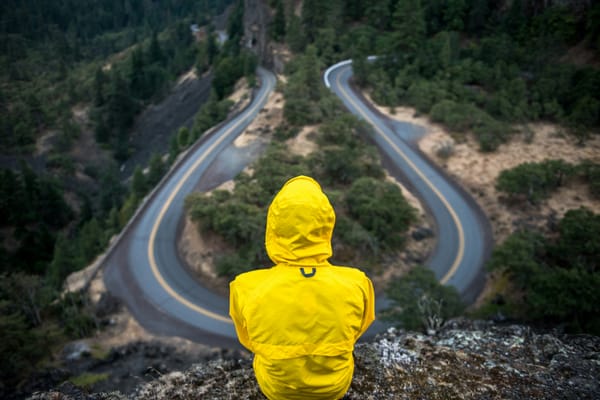How much is too much and how to make it healthy?
Not all screen time is bad - and there are ways to help make screen time healthy!
Parents used to worry (my parents certainly did) about kids watching too much TV - remember the warning 'your eyes will turn square?' Funnily when I used that line on my 10 year old he correctly said 'but the TV's a rectangle!'
Screen time for the current generation of kids is much more complicated. It's not just TV; it's phones, tablets, social media, video games, consoles... and they all captivate kids from a very young age.
Here's some recommendations collated from The Child Mind Institute and The Australian Institute of Family Studies to keep kids safe online.
Babies and Toddlers (0-4)
Suggested: no screen time for children under 2 years old / one hour per day for children 2-5 years old
US recommendations say to avoid TV for under 18 months and Australian recommendations say the same for under 2 years old - which is not always practical! For young children, high quality programming is recommended and ideally watching along with your child (again not always practical!). Try to limit where possible.
When it comes to phones or tablets, set your boundaries early. eg if you don't want it used at the dinner table, don't allow it from the start. Model the same behaviour as an adult.
Try not to replace traditional play with technology. Allow them to develop creativity and use their developing fine motor skills with traditional toys like blocks, Duplo or Lego and playdoh for example.
It is also strongly recommended to leave devices at home. Sure, they are helpful for long car trips or other journeys, however it's ideal to let children explore the world when they're in a pram rather than looking at a screen.
Primary school age kids (5-11)
Suggested: no more than 2 hours / day for children aged 5-17 years old (not including school work)
Ideally try to watch things together. This is especially true for online programs where you can't always predict what might follow. It is so much harder to shield your child/ren from worldwide events than when we were kids. Back then it was a case of simply turning off the TV news! If you see things that aren't right - friendship issues, bullying, racism, unrealistic standards for body image, 'beauty' etc - call it out and discuss with your child. Not only does this reinforce your values, it also teachers kids to consume media with their own opinions.
It's also important to continue to enforce boundaries at this age including when and where they can use screens, and for how long. Home learning and online learning during Covid-19 lockdowns made this a lot harder to police, and we acknowledge it's hard to revert back to previous standards. Providing excellent alternatives is a great way to get kids off screens. This could be a family movie night, sport or any kind of family adventure!
It is highly recommended to not use screens as the reward or consequence for behaviour. This makes screen time even more desirable for kids.
Even if they're are not looking specifically, it is very easy for kids to discover pornography. As awkward as it may seem at the time, you are much better having an open and honest discussion with them BEFORE they see something they can't 'un-see.' If they do see something accidentally (or not), it's very important to let them know, it is not realistic - just like so many other movies!
Tweens and teens (12+)
Suggested: no more than 2 hours / day for children aged 5-17 years old (not including school work)
It is so important to keep modelling good tech behaviour as kids get older. It’s really easy to let things slide when they have their own devices, and again habits and rules changed in many homes during Covid-19 lockdowns. If you don't use your phone at the table for example, you are modelling what you expect from your kids, and it also shows that their company is worthy of your attention.
Rules around social media are very important to discuss and agree as early as possible. Whatever age your family decides is appropriate for social media, make sure that your child is very careful about their privacy. Issues around privacy change rapidly, including for example Apple's latest iOS 17 upgrade where contact details can be easily and freely shared with nearby users using 'Name Drop'. This is automatically turned on with the upgrade. To disable this feature, go to Settings / General / Airdrop / turn off 'Bringing Devices Together'
The rules we like to use for anything you post online is 'would you be OK if grandma or grandpa (or your school teacher / future boss) saw this?' If the answer is no, then don't post, share or engage!
It's also great to friend your kids on social media but don't spy on them unless you have concerns.
Some other hard and fast rules we stick to are - nudes are always a bad idea - even if sent to someone they trust. Think of the grandma / grandpa analogy from above - if you're not willing to show them something - don't put it online!
And finally - texting is a great way to communicate - but messages can be interpreted differently to the way you mean. Make it clear when you are joking, and if you're not sure how to interpret someone else's message - ask them to clarify before it escalates!
We are well aware that Zown is part of kids' screen time. At the core of Zown is the notion that we want kids to be able to go there to feel good about themselves and the world around them - NOT to spend a lot of time there! We have resources to tell kids about the dangers of too much screen time and other ideas to get them up and moving! We fully support healthy screen time habits and will continue to communicate this.









